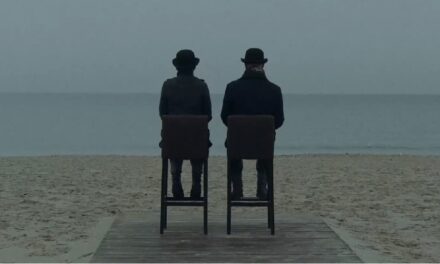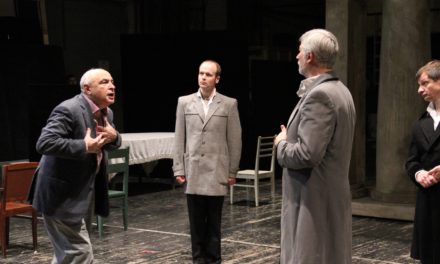This year’s Theatre Biennale (15 to 30 June), entitled, Niger and Albus (Black and White), sees directors Gianni Forte and Stefano Ricci keen – as they note in their introduction – to “open the doors of the imagination” by inviting to Venice, “an extraordinary line up of poetic and visionary artists”. The have selected practitioners from many parts of the globe for their “ability to awaken our conscience and delineate the contours of a more desirable future.”
The Anglo-German company Gob Squad, recipients of the Silver Lion Award, who opened this year’s Biennale Festival, are indubitably in this category. Truly European, the seven core members got together in Nottingham, UK in 1994, while they were still at University, and later they relocated to Berlin. In Venice they presented an unusual double bill; a video installation, Elephants in Rooms and a play, Creation (Pictures for Dorian). I caught the former at Marghera’s cultural hub and park, a fifteen-minute bus ride outside Venice. Inside a dark room, a series of video screens showed figures in China, India, Germany and the UK in their homes and in outdoor spaces during lockdown. The trigger for the artwork, as Gob Quad member Simon Will indicated, is the expression ‘an elephant in the room’ which Will defined at the press conference, as ‘fear’, ‘power’, ‘fascism’. As I moved from screen to screen, the isolation and anguish of the various characters pinpointed the collective despair experienced by so many of us during the pandemic. Time and again, moments of intense life were conjured up. You seem to enter the tidy, modern room of an Indian lady, who moves erratically around in a weird hat, in stark contrast to a beautiful cat, serenely perched on a chair. A noise of galloping hooves, triggers the woman’s frantic shouts: “The horses are coming! The horses are coming!” – perhaps a memory of India’s colonial past resurfacing in her unhinged mind. Then onto another room\screen, and another lonely woman, who quietly performs a daily ritual, drinking tea and tending her flowers, until she starts sobbing, a sound which chimes throughout the large venue, joining other cries and shouts on other screens. I was curious to find out more about the creative process behind the installation and asked Simon Will. He explained that the short scripts resulted from an exchange between members of Gob Squad and the various actors. They then rehearsed, filming some scenes several times before the final edit in which the different films seem to be in conversation with each other as the viewer moves from screen to screen.
Gob Squad’s reimagining of Oscar Wilde’s novel, The Picture of Dorian Gray, Creation (Pictures for Dorian), reworks, or perhaps better to echo the title, ‘recreates’ Wilde’s major concerns: ageing, time passing, the aesthetic categories of beauty and ugliness, and representation. Each time the group revives the play (it had its debut in 2018) the cast is composed of members of Gob Squad and local actors. On this occasion, they hailed from the Veneto area, and the age range from 18 to 75, allowed the group to explore the chosen themes across three generations, sometimes harking back and at others, looking forward.
As the play opens, we watch a woman tending a flower arrangement center stage, with a single light nearby. A second actor, sitting on the edge of the stage, is sketching. She announces she is making a drawing of an audience member and hands it to somebody in the stalls. This physical exchange highlights the theme of representation: how do others see us? How do we see ourselves? How do artists see us? The girl\artist, who is working on the ikebana, can create a work of beauty, only if she has an onlooker, and in this case it is the audience. As audience members, then, we are called on to play a part, sometimes performing physical exercises, such as closing our eyes and re- imagining the flowers, and then opening them to behold a large screen, with the most exquisite flower arrangement, our senses titillated by the beauty of the colors and shapes. Still everything changes, and like Wilde’s portrait of Dorian, mutability is in the nature of things. During the next ninety minutes, the flowers, which reappear sporadically, will indeed wither and die under the harsh light. These opening scenes grabbed my attention and made me aware of a new role I was being asked to play. However, as the play evolved, a steady stream of new characters, reciting monologues and in picture frames to underscore their role in a work of art, varied in quality. Some of them were very powerful, like the veteran Venetian actor in his seventies, who looked back on a star studded career, revealing his relentless desire to still be seen and heard. Gob Squad insist that there is no room for a director or dramaturg in their work, roles which would presumably have honed down the play and perhaps improved the shape. Still, I suppose, we need to respect the anarchy the group seeks, a characteristic of these remarkable artists.
This post was written by the author in their personal capacity.The opinions expressed in this article are the author’s own and do not reflect the view of The Theatre Times, their staff or collaborators.
This post was written by Margaret Rose.
The views expressed here belong to the author and do not necessarily reflect our views and opinions.



















